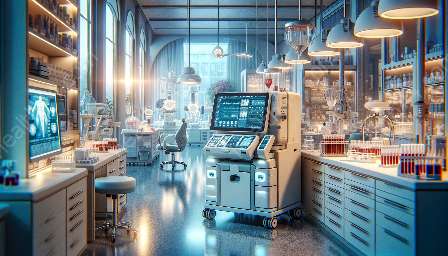Mass spectrometers are advanced analytical instruments that play a crucial role in clinical testing equipment and medical devices. They are used to analyze the chemical composition of various substances, making them an indispensable tool in healthcare settings. This comprehensive guide explores the fascinating world of mass spectrometers, their uses, technologies, and impact on the healthcare industry.
The Basics of Mass Spectrometers
Mass spectrometers are sophisticated instruments used to measure the mass-to-charge ratio of ions. They are capable of analyzing a wide range of sample types, including gases, liquids, and solids. The basic components of a mass spectrometer include:
- Ion Source: This is where the sample is ionized, creating charged particles.
- Analyzer: The ionized particles are separated based on their mass-to-charge ratio.
- Detector: The separated ions are detected and their abundance is measured.
These components work collaboratively to provide valuable information about the chemical composition of the sample being analyzed.
Applications in Clinical Testing Equipment
Mass spectrometers have revolutionized the field of clinical testing equipment, enabling highly sensitive and specific analysis of biological samples. They are extensively used in:
- Physiological Research: Mass spectrometers are employed to analyze biomolecules, metabolites, and drugs in physiological fluids, aiding in the diagnosis and monitoring of various diseases.
- Toxicology: They play a crucial role in identifying and quantifying toxins, drugs, and their metabolites in biological samples, contributing to forensic and clinical toxicology.
- Proteomics: Mass spectrometers are utilized for protein analysis, enabling the identification and characterization of proteins related to disease states and drug responses.
These applications demonstrate the vital role of mass spectrometers in enhancing the accuracy and efficiency of clinical testing equipment, ultimately leading to improved patient care.
Integration into Medical Devices & Equipment
In the realm of medical devices and equipment, mass spectrometers are integrated into various tools and systems to enable real-time analysis and diagnostics. Some notable examples include:
- Point-of-Care Testing: Miniaturized mass spectrometers are incorporated into portable devices for rapid on-site analysis of biological samples, allowing for immediate medical decision-making.
- Therapeutic Monitoring: Implantable mass spectrometry-based sensors are being explored for monitoring drug levels in the body, ensuring precise and personalized therapeutic interventions.
The seamless integration of mass spectrometers into medical devices and equipment is paving the way for innovative solutions that enhance patient care and treatment outcomes.
Technological Advancements and Future Prospects
The field of mass spectrometry continues to witness rapid technological advancements, driving its expansion into diverse applications within the healthcare industry. Some notable developments and future prospects include:
- High-Resolution Mass Spectrometry: Ongoing advancements in high-resolution mass spectrometry are enabling detailed analysis of complex biological samples, providing unprecedented insights into disease mechanisms and biomarker discovery.
- Automation and Miniaturization: The automation and miniaturization of mass spectrometers are facilitating their integration into compact medical devices, enabling point-of-care diagnostics and personalized medicine.
- Data Analysis Tools: Advanced data analysis software and algorithms are being developed to handle the vast amounts of data generated by mass spectrometers, allowing for streamlined interpretation and decision-making.
These technological advancements underscore the transformative potential of mass spectrometry in shaping the future of clinical testing equipment and medical devices.
Impact on Healthcare
The widespread adoption of mass spectrometers in clinical testing equipment and medical devices is poised to have a profound impact on healthcare, offering benefits such as:
- Precision Medicine: By enabling comprehensive molecular profiling of patients, mass spectrometers are driving the implementation of precision medicine approaches, leading to tailored treatments and improved patient outcomes.
- Disease Diagnosis and Monitoring: The sensitive and specific analysis capabilities of mass spectrometers facilitate early disease diagnosis and accurate monitoring of treatment responses, contributing to proactive healthcare management.
- Drug Development and Pharmacology: Mass spectrometry-based technologies are accelerating drug discovery and development processes, enhancing pharmacokinetic and pharmacodynamic evaluations for novel therapeutics.
The growing influence of mass spectrometers in healthcare signifies a paradigm shift towards more reliable, efficient, and personalized medical practices.
Conclusion
Mass spectrometers stand at the forefront of analytical technologies, playing a pivotal role in clinical testing equipment and medical devices. Their multifaceted applications, coupled with ongoing technological advancements, are reshaping the landscape of healthcare, ushering in new possibilities for precision medicine, diagnostics, and therapeutics. As mass spectrometers continue to evolve, their impact on healthcare will undoubtedly expand, driving innovation and enhancing patient care across the globe.


